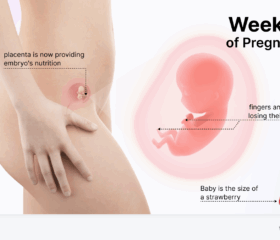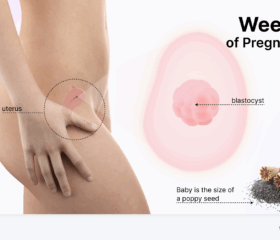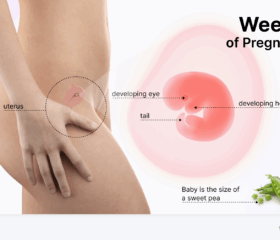Pregnancy Week by Week
19 Weeks Pregnant
Your baby is as big as a mango.
6.5
inches
8
ounces
19 Weeks Pregnant: Signs, Symptoms, & Baby Development
Congratulations on making it so far. Plenty of exciting developments are happening to your growing baby and your own body. Let’s dive into what you can expect this week.
Your baby's development at 19 weeks
At 19 weeks, your baby is about as big as a mango, measuring approximately 6–7 inches long and weighing around 7–8.5 ounces. 12
It’s not just about size; big changes are also happening to your baby internally:
- Senses: These are really coming alive. The nerve cells for taste, smell, hearing, sight, and touch are all developing rapidly within his brain.
- Fingerprints: The skin on your baby’s fingers and toes is forming unique, permanent patterns, making his fingerprints and footprints one of a kind. Even if you’re having identical twins, they’ll each have their own prints.
- Vernix caseosa: A white, waxy substance called vernix caseosa is coating your baby’s skin. This protective layer acts as a moisturizer, safeguards against bacteria, and even aids in the development of his lungs and digestive tract. You might catch a glimpse of it at birth, although most of it will have shed by then. 2
- Brown fat: Your baby is now developing his brown fat, which helps him regulate his body temperature once he’s born. This fat also plays a role in his metabolism and insulin regulation.
- Teeth: While you won’t see them on an ultrasound for several months, your baby’s adult teeth are already beginning to form beneath the gums. 1
- Movement: Your baby is becoming increasingly active. He’s practicing sucking and swallowing and is moving around more and more each day.
Can you feel your baby move at 19 weeks?
One of the most exciting parts of the second trimester is when you feel your baby kick or move for the first time. This can happen between weeks 16 and 22, but it varies between pregnancies.
At first, his movements may feel like a gentle fluttering or like bubbles in your tummy. As your baby grows, his movements will get stronger and more distinct. Expect little kicks, jabs, and even a few rolls.

What to expect in your body at 19 weeks
As your baby grows, your body is going through its own set of changes, some of which may catch you off-guard. Here’s what you might notice this week.
Your expanding uterus
As your uterus expands, you may need to deal with some pesky aches and pains. One common complaint is with the round ligaments—the ligaments that support your uterus. The growth of your uterus causes them to stretch and thicken. This, in turn, can cause sharp, stabbing pains in your groin area, which might radiate to your hips. 3
Moreover, your center of gravity is shifting, putting extra pressure on your lower back. The result: unpleasant backaches. 4
Your changing skin
You might notice changes in your skin, such as redness on your palms, darkened skin on your face, and a dark line (the linea nigra) appearing on your abdomen. But before you let your vanity suffer too much, know that most of these changes are temporary and should fade within a few months of giving birth.
Your belly at 19 weeks
At 19 weeks, your baby bump may be more prominent, but how and when you start showing your pregnancy varies greatly from person to person. Some factors that can affect the size of your bump include:
- Whether this is your first pregnancy: Women who have been pregnant before tend to show earlier due to their previously stretched muscles. 5
- Your body type: Shorter women (or those with shorter torsos) may show sooner because there’s less vertical space in their abdomens. Taller women or women with longer torsos can have smaller-looking bumps.
- Your baby’s position: The way your baby is positioned can affect the shape and size of your bump. For example, if he’s in the breech position (feet down), your bump may be larger. 6
- Whether you’re carrying multiples: Carrying twins or multiples can lead to a larger bump, and having a noticeable baby bump earlier than most moms-to-be is one of the potential early signs that you’re expecting twins or more.
- Your weight gain: As you’d expect, how much weight you gain during pregnancy also impacts your belly’s size.
Whether you feel like you’re showing a lot or a little, as long as your doctor confirms your baby is growing well and your weight gain is on track, there’s nothing to worry about.
Your symptoms at 19 weeks
Your hormonal changes, coupled with your increasingly heavy baby, may lead to new pregnancy symptoms. You may still need to contend with some familiar ones, too. This week, you might experience:
- Nosebleeds: Your increased blood volume can cause the blood vessels in your nose to expand, which can lead to more frequent nosebleeds. 7
- Increased appetite: You may find yourself feeling hungrier these days. This is normal as your baby grows—you need extra nutrients.
- Shortness of breath: You may feel slightly out of breath because your body needs more oxygen and your growing uterus is putting pressure on your diaphragm. 8 Moreover, the swelling in your nasal passages can make breathing a little harder.
- Dizziness: You might experience lightheadedness. Your uterus is also putting pressure on your blood vessels, reducing your blood flow. 9
- Leg cramps: You may have to deal with leg cramps during this stage, especially at night. These are caused by extra weight and your slowed blood circulation. 10
You can keep track of your symptoms in a journal, calendar, or pregnancy tracker app just in case there’s anything amiss to bring to your doctor’s attention. The best pregnancy trackers also provide educational content and suggestions for managing your symptoms.
How to manage your symptoms at 19 weeks
While these symptoms are common, they can still be uncomfortable. It’s also important to speak with your doctor if anything feels unexpectedly severe or otherwise worries you.
Here’s how you can manage some of the most frequent discomforts in this period:
Get plenty of rest
It might seem like a no-brainer, but you need your rest. If you’re suffering from round ligament pain, take a break and avoid movements that trigger the pain. Relaxing is also a good way to combat any shortness of breath or dizziness you may be experiencing.
Stay moderately active
While resting is important, you should aim to get moving at least a little, too. Gentle stretching can help you deal with cramps and aches, though you should try to avoid strenuous activities and standing for too long.
Stay hydrated
Throughout your pregnancy, you’ll need to stay hydrated. Aim to drink at least 8–12 cups of water a day.
Drinking enough water may help you avoid muscle cramps, dizziness, and constipation during pregnancy. On that last note, prune juice is an excellent natural laxative that many moms-to-be swear by, but talk to your doctor before using it too heavily. You don’t want to overdo it. 11
Take advantage of home remedies
Self-care is especially important during pregnancy. Look to simple home remedies to combat common second-trimester symptoms:
- Nosebleeds: If nosebleeds are disrupting your day, sit down, lean forward, and pinch the lower part of your nose while breathing through your mouth. Applying cold to the bridge of your nose can also help.
- A stuffy nose: Try closing one nostril with your thumb and gently blowing out the other.
- Hip pain: If hip pain is keeping you up all night, try sleeping on your side with a pillow between your knees. Consider buying a pregnancy pillow if you don’t have one already.
- Changes to your nails: Now’s a good time to treat yourself to a manicure or pedicure, especially since pregnancy hormones can make your nails grow faster and stronger. 12 Just be sure to choose a well-ventilated salon and opt for a non-toxic polish.
Look after your mental health
It’s not just your physical health you need to be mindful of. Prioritize your emotional well-being and put aside some time to enjoy yourself. Go out to dinner, see a movie, or even plan a babymoon to enjoy your last child-free moments of peace and quiet.
This is also a great time to connect with fellow parents-to-be, either online or in person. You can join a prenatal yoga class, a birth club, or online groups to start building relationships.
Cater to your cravings (in moderation)
While occasionally giving in to your cravings is OK, when you can, try to substitute them with healthier pregnancy snacks like fruits, trail mix, and whole wheat pretzels.
Focus on nutritious foods to satisfy your hunger and keep healthy snacks handy. Try to incorporate foods like eggs, salmon, leafy greens, nuts, yogurt, and oatmeal into your pregnancy diet.
Get maternity clothes
As you and your baby continue growing, your beloved wardrobe won’t stay as comfortable as it used to be. It might be time to start wearing maternity clothes. Search for loose-fitting, comfy options that won’t compromise your fashion sense.
Look into a maternity shoot now
If you’re interested in maternity photos, you should schedule them in the early-to-mid third trimester (weeks 28 to 34). Photographers often book up well in advance, so start looking for options now.
Don’t hesitate to contact your doctor
Most pregnancy symptoms aren’t cause for concern, but it’s important to be vigilant and call your doctor if you notice any unusual changes with:
- Abdominal pain: While some abdominal aching is normal, severe cramping, especially if it’s accompanied by a fever or dizziness, should be addressed by a professional.
- Constipation: If constipation becomes a problem, talk to your doctor about any medications you’re taking that could be exacerbating it and the potential alternatives. For example taking iron supplements can lead to constipation.
- Shortness of breath: If you have sudden difficulty breathing, seek immediate medical attention.
- Cravings: If you find yourself craving non-food substances, like dirt or clay, you should likewise contact your doctor straight away. It means you have pregnancy-related pica—a condition that’s caused by a nutritional deficiency. 13
You should also take a proactive approach to protecting your and your baby’s health by asking your doctor about any vaccinations you should get. You can get the flu shot while you’re pregnant, and you might need others, too.
What important appointments and tests are there at 19 weeks?
As you approach the halfway point of your pregnancy, you likely have a few important appointments on the horizon, which we’ll take a look at now.
The 20-week anatomy scan
Around this time, you’ll have a mid-pregnancy ultrasound called the anatomy scan or gender scan. This detailed pregnancy ultrasound will allow the technician to: 14
- Check your baby’s development: They’ll examine your baby’s brain, spine, heart, and other organs to ensure everything is developing properly.
- Determine your baby’s sex: Here’s another piece of big news! This is often the time when you find out your baby’s sex with a quick peak between the legs. However, it’s possible your baby will be positioned wrong for that, so don’t get your hopes too high.
- Get pictures: You can ask for some printed images from the ultrasound to take home with you. (Let’s hope your baby isn’t camera-shy.)
Finding a pediatrician
While you have doctor visits on the brain, now’s a good time to start looking for a pediatrician for your baby.
Reach out to your family and friends for recommendations, and schedule appointments with potential pediatricians to ask them questions about their practice and approach to patient care.
Prioritize finding someone you trust and have a decent rapport with. You’ll be spending a lot of time with your baby’s doctor in the coming year, so take the time to find the right pediatrician for your little one.
Final thoughts
Well done on making it to 19 weeks! As you get closer to the halfway point of your pregnancy, it’s all probably starting to feel more and more real. As always, remember to communicate openly with your doctor about any concerns you may have. You’ve done great so far, so keep pushing forward.
Article Sources
- National Health Service. "Week 19" Retrieved June 24, 2025.
- The Birth Company. "Week 19 of pregnancy (Days 133-139)" Retrieved June 24, 2025.
- Saint Luke’s. "Understanding Round Ligament Pain in Pregnancy" Retrieved June 24, 2025.
- American College of Obstetricians and Gynecologists. "Back Pain During Pregnancy" Retrieved June 24, 2025.
- Tommy’s. "How does a second pregnancy differ from the first?" Retrieved June 24, 2025.
- Cleveland Clinic. "Fundal Height" Retrieved June 24, 2025.
- The University of Texas Southwestern Medical Center. "What causes nosebleeds in pregnancy, and tips to manage them" Retrieved June 24, 2025.
- Nemours KidsHealth. "Why Do Some Women Feel Short of Breath During Pregnancy?" Retrieved June 24, 2025.
- American Heart Association. "Dizziness during pregnancy: When is it a concern?" Retrieved June 24, 2025.
- The University of New Mexico. "What Causes Leg Cramps in Pregnancy?" Retrieved June 24, 2025.
- Harvard Health Publishing. "Prune juice for constipation? A new study says yes" Retrieved June 24, 2025.
- Nemours KidsHealth. "10 Things That Might Surprise You About Being Pregnant" Retrieved June 24, 2025.
- MedlinePlus. "Pica" Retrieved June 24, 2025.
- Penn Medicine. "News and views" Retrieved June 24, 2025.







